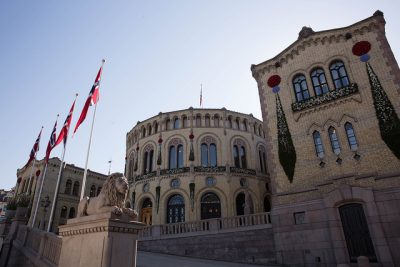NEWS ANALYSIS: Protests were loud this week when members of the Norwegian Parliament prepared to vote in favour of a measure that will make Norway’s financial regulatory system answerable to EU rules. It’s the latest example, cry the critics, of Norway undermining its own sovereignty in order to gain access to EU markets.

Even one of the government’s own support parties, the Christian Democrats, was planning to vote against the measure that critics also claim has been rushed through Parliament in order to avoid opposition. Hans Olav Syversen of the Christian Democrats, who leads the parliament’s finance committee, fears it will tighten the EU’s grip on Norway, even though Norway is not a member, and his party’s Members of Parliament were voting against it.
Several other MPs reportedly would like to vote against it, too, but are being ordered to follow party lines in this case. That’s because the powers-that-be in the two conservative government coalition parties plus their other support party, the Liberals, and the Labour Party in opposition have decided the measure is a good thing and they must obtain a 75 percent majority of MPs voting in favour. By voting as a bloc, they’ll get it.
Since Norwegians have twice voted against joining the EU, their political representatives have no direct say in the formulation of EU policy and regulations. In order for Norway to retain access to its biggest markets, all of which lie within the EU, Norway entered into the so-called European Economic Area agreement (EEA/EØS) that forces it and the other non-member countries Iceland and Liechtenstein to pay large sums to the EU every year and follow many EU regulations in order to do business with EU-member countries. The EEA countries’ conduct is monitored by the surveillance authority ESA.
Now the ESA will also be able to make sure that Norway’s financial regulators also follow EU regulations, and that’s what’s kicked up a fuss. It means Norway, for the first time since the EEA/EØS deal was struck in 1994, will once again transfer its own power over its own rules and regulations to an “over-national” agency of which it’s not a part. Norway’s Constitution restricts such challenges to its sovereignty, which is why at least 75 percent of all MPs must approve.
Fear of setting a precedent
Norway’s small Center Party, which has always been anti-EU along with the Christian Democrats and the Socialist Left (SV), doesn’t take that lightly and has been demanding either rejection of the financial regulatory measure or at least postponement of a vote on it. They fear it will create another precedent that eventually will also make Norway beholden to many other EU rules and directives. Instead of voting to join the EU and finally gaining a say in the formation of such rules and directives, they want Norway’s own rules to remain supreme and unchallenged.
“The government has found a legal construction to get around our Constitution, and I fear this will set a precedent in questions regarding other regulatory authorities,” Trygve Slagsvold Vedum, the Center Party leader who’s been among the most outspoken critics, told newspaper Dagsavisen. “This is a gradual undermining of the fact that the (Norwegian) people have said ‘no’ to joining the EU.” He fears Norway’s energy, telecoms and data sectors will also soon have to answer to EU rules, not Norway’s.
Labour, meanwhile, which usually opposes measures put forth by the conservative minority government, is going along this time. Its leaders have generally been in favour of joining the EU and think Norway is best-served by following the EU’s new financial regulations that followed the finance crisis of 2008. Their goal is to maintain competitiveness in the European market. For once it seemed to agree with Finance Minister Siv Jensen of the Progress Party, who declared in Parliament last week that “this isn’t about self-determination or how Norway shall regulate financial institutions, but rather to find a solution for how the Norwegian financial regulators can reflect the news systems that have emerged in the EU,” Jensen said.
Changes loom
It means, in practice, though, that Norwegian bank customers may no longer have their deposits insured up to NOK 2 million but rather a much lower level set by the EU. Norway’s own capital requirements or lending rules may also cave to EU rules. That hasn’t bothered the banking industry itself, with the head of its trade association Idar Kreutzer dismissing Vedum’s fears, for example, as scare tactics.
It’s vitally important, Kreutzer argues, that Norwegian business and now banks retain access to Europe’s inner markets. He claims the EU, just like Norway, wants “solid and stable financial institutions” and is thus strengthening its regulation. Norwegian financial institutions, he says, already have “harmonized” much of their rules with the tougher EU rules introduced after the finance crisis.
Newspaper Dagsavisen nonetheless editorialized that Norway’s political majority was not showing much respect for the constitution, and instead trying to get around it, to satisfy EU officials in Brussels.
newsinenglish.no/Nina Berglund

